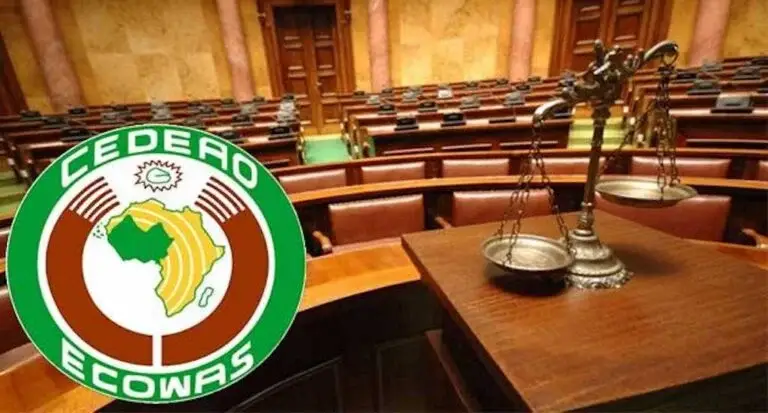Africa
ECOWAS At 50: The Unrealized Dreams -By Samuel O. Adeyemi
Regional integration is not a luxury; it is a necessity. In a world of increasingly fragmented global trade and shifting geopolitical alliances, West Africa cannot afford to remain disjointed. The region’s youth are hungry for opportunity. Its entrepreneurs are bursting with potential. Its farmers are ready to scale. But without genuine regional cooperation, all that promise remains locked behind borders, both physical and bureaucratic.

While West African leaders were popping champagne at the luxurious Eko Hotel to mark the golden jubilee of the Economic Community of West African States (ECOWAS), a petty trader was making his way from Lagos to Abidjan, the capital of Côte d’Ivoire. His journey wasn’t adorned with the fanfare of officialdom. It was marred by extortion, harassment, and needless delays which is an all-too-familiar ordeal for countless West Africans trying to move across supposedly open borders within the region.
Despite carrying valid travel documents, this trader was compelled to “settle” immigration and customs officers at nearly every checkpoint. At each national boundary, the promise of free movement, enshrined in the ECOWAS Protocol on Free Movement of Persons, was replaced with the grim reality of bribes demanded in the name of unofficial “entry stamps.” His journey just like those of many farmers, drivers, women traders, and youth represents the stark contradiction between the dream of ECOWAS and the lived experiences of its citizens.
ECOWAS was founded in 1975 with bold aspirations: to foster economic integration, ensure free movement of people and goods, and build regional solidarity. Fifty years on, its record remains mixed, and in many critical areas, disappointing. Yes, there have been commendable strides, such as the introduction of the ECOWAS passport, conflict mediation efforts, and common external tariff frameworks. But the deeper economic integration that would truly empower ordinary citizens is still largely a mirage.
Today, intra-regional trade in West Africa remains abysmally low, accounting for just 10–15% of total trade, according to the African Development Bank (AfDB) and the United Nations Economic Commission for Africa (UNECA). In its West Africa Economic Outlook 2020, AfDB noted that “intra-regional trade in West Africa remains relatively low… due largely to poor infrastructure, tariff and non-tariff barriers, and weak implementation of regional agreements.” UNECA echoes similar concerns, showing that ECOWAS lags behind other African regions in realizing the benefits of regional commerce.
Why is this so? Because real trade is not just about policies on paper, but about roads that work, borders that function seamlessly, and officials that serve rather than extort. In short, it is about political will and implementation.
The small trader’s journey underscores a bigger point: if ECOWAS doesn’t work, then the African Continental Free Trade Area (AfCFTA) may remain a beautiful idea on paper. ECOWAS was supposed to be the building block, a prototype for African integration. If we cannot make free movement and trade work within 15 countries, how can we hope to do it across 54?
The real tragedy is that the dreams of ECOWAS were never abstract. They were practical and attainable. A region where goods and people move freely. Where a young entrepreneur in Ghana could seamlessly export services to Nigeria. Where a farmer in Burkina Faso could access markets in Senegal without facing 20 checkpoints in a 600km stretch. Where regional infrastructure would be harmonized to fuel production and commerce, not just consumption.
Instead, what we have today is a region fragmented by national interests, plagued by insecurity, burdened by bureaucracy, and hindered by the very institutions meant to advance integration. Leadership summits filled with protocol and celebration will not mask the failures of implementation. It is not time to toast. It is time to reckon.
ECOWAS leaders must wake up. The golden jubilee should have been a moment of reflection not just on what has been achieved, but on what has been lost. The dreams of integration must be revived, not with empty declarations, but with decisive actions. We must dismantle artificial and illegal checkpoints that stifle movement.
There must be a full implementation of the ECOWAS Trade Liberalization Scheme (ETLS). We must invest in cross-border infrastructure like rail, road, and digital corridors. Streamlining of customs and immigration procedures to favor trade, not rent-seeking should be a priority. And above all, hold national and regional institutions accountable for the promises they make.
Regional integration is not a luxury; it is a necessity. In a world of increasingly fragmented global trade and shifting geopolitical alliances, West Africa cannot afford to remain disjointed. The region’s youth are hungry for opportunity. Its entrepreneurs are bursting with potential. Its farmers are ready to scale. But without genuine regional cooperation, all that promise remains locked behind borders, both physical and bureaucratic.
ECOWAS at 50 should not be remembered as a missed milestone. It should be the inflection point for change. The real celebration will come when the petty trader can make his journey, not through bribes and barriers, but through a seamless corridor of opportunity, one that reflects the original dream of West African unity.
Until then, the dream remains unrealized.
Samuel O. Adeyemi is a global trade communication strategist. He writes from Lagos.

























